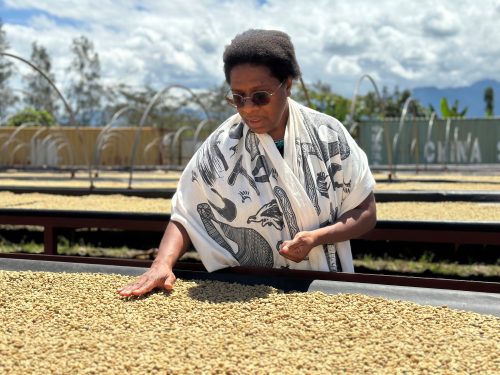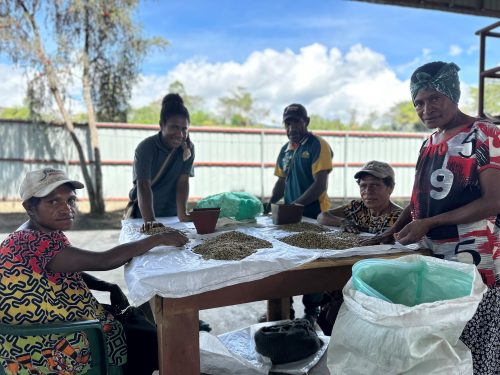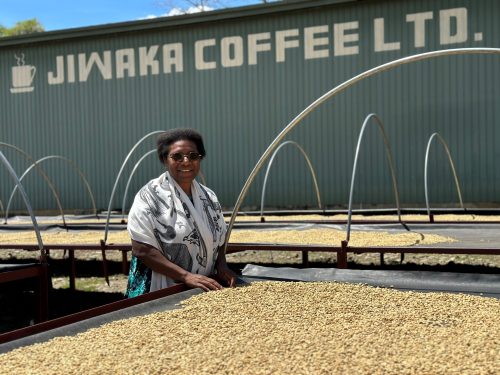
Every drink of coffee enjoyed today carries stories untold. Stories of hardship, risk and sacrifice that wouldn’t normally be found on product packaging. Stories that help us better appreciate the journey and the people behind the fix.
Located in Papua New Guinea’s mountainous Highlands Region, Jiwaka Province is home to thousands of coffee-farming households. The journey of getting coffee cherries to the nearest coffee mill usually starts with a long trek up and down hills, carrying cherry-laden bags to the roadside where vehicles then collect the bags and head for the mill.
The arduous journey represents the supply chain of small businesses like Jiwaka Coffee Limited, which sources coffee beans from over 900 farmers in 11 villages in Jiwaka and Western Highlands. The end product – PNG specialty coffee in export markets.
At the frontline of the coffee story in Jiwaka is Emma Wakpi, known for her dedication to helping coffee farmers in her community.
“I live and work among my people and the surrounding Western Highlands. Coffee is a means of helping our people improve their livelihoods,” says Emma, who oversees the operations of Jiwaka Coffee Limited.

Jiwaka is PNG's third largest coffee-growing region and contributes 12 per cent of the national harvest. While coffee farming is the main income earner in these parts, there are also multiple challenges involved, a key one being the distance between farms and buying stations and near impassable roads.
“Every villager has a small coffee plot they use as an ATM when they need cash. They go to the back of their gardens or to their coffee plots to pick cherries, then sell it to get the money they need for the day,” Emma says.
She recalls a time when people travelled long distances just to get their coffee to the roadside.
“We started as a dry mill factory in 2000 but were not fully operational until 2018 so people were very dependent on roadside buyers and other factories that are quite far away,” she says.
In 2018, Jiwaka Coffee Limited set up collection sites in the villages, making it easier for farmers to get their coffee to a pick-up point.

Once the bags of cherries are delivered to the mill, processing must be done within a 12-hour period to retain its quality. Workers filter through the cherries to pick out dense, dark red, and ripe cherries for the next stage of processing. The cherries are then pulped, fermented, and sun-dried.
Emma says Jiwaka Coffee Limited has adopted sustainable practices like natural and honey cherry processing which doesn’t require water for fermentation and reduces waste water that can damage the environment.
Depending on weather conditions, the drying process could take up to 14 days and the resulting parchment beans are put through a dry mill, eventually turning what were initially coffee cherries into green coffee beans. Workers then sort and grade the beans by size and colour before the beans are packed into bags and shipped to Amamas Coffee Inc., a social enterprise that sources exclusively from Jiwaka Coffee Ltd and distributes their coffee to a network of roasters across the United States.
In April 2023, Jiwaka Coffee Limited received support from the Australia and New Zealand-funded Pacific Horticultural and Agricultural Market Access Plus (PHAMA Plus) Program, managed by DT Global, to participate in the Specialty Coffee Expo in Portland, Oregon, US. The expo is North America’s largest gathering of specialty coffee professionals.
Emma was nominated by the Coffee Industry Corporation (CIC) and supported by PHAMA Plus to attend the expo.
“For Jiwaka Coffee Limited, it presented an opportunity to gain insights into the North American specialty coffee culture. The expo allowed me to connect, learn and get a great overview of the future of specialty coffee. I was also pleased to see our Jiwaka Coffee being sampled and promoted to the global coffee family,” she adds.
The expo became a catalyst for Jiwaka Coffee Limited’s growing success and has since secured more US buyers.
Emma has gone on to represent the PNG’s Women in Coffee Association (WICA) chapter of the International Women’s Coffee Alliance, an initiative supported by PHAMA Plus to help brew a better future for the over 6,000 women, like Emma, that make up PNG’s coffee industry.

Compared with others in the Pacific, PNG coffee has a strategic advantage in accessing new high-value trade opportunities, both locally and globally, says PHAMA Plus’ PNG National Facilitator, Tamar Amean.
“Our partnership with the Coffee Industry Corporation focuses on enhancing productivity among smallholder farmers while transitioning towards certified and specialty trade to meet evolving market demands. Additionally, our collaboration with the PNG WICA aims to empower diverse women coffee groups and farmers, enhancing their representation and connections with markets for sustainable growth,” she explains.
Since 2015, PHAMA Plus has worked with the PNG coffee industry and businesses like Jiwaka Coffee Limited to improve productivity among smallholder farmers while moving towards certified and specialty trade for better returns.
For Jiwaka Coffee Ltd, Emma says it’s the “why” of what they do that drives their work. “We want our farmers to get fair prices, coffee farming is quite a laborious activity, planting coffee, carrying coffee, picking coffee; and it’s often the only source of income for farmers,” Emma said.
In the world of coffee, Emma Wakpi stands as a pioneer, leading the charge for positive change in her community and PNG's coffee industry.
“If we’re serious about development, I feel that coffee will help improve livelihoods. When farmers improve their households, their community improves to and the whole nation benefits as a result of that,” she says.
As we reach for our next coffee, we have people like Emma and the thousands of farmers like those in Jiwaka to thank for keeping the world caffeinated.